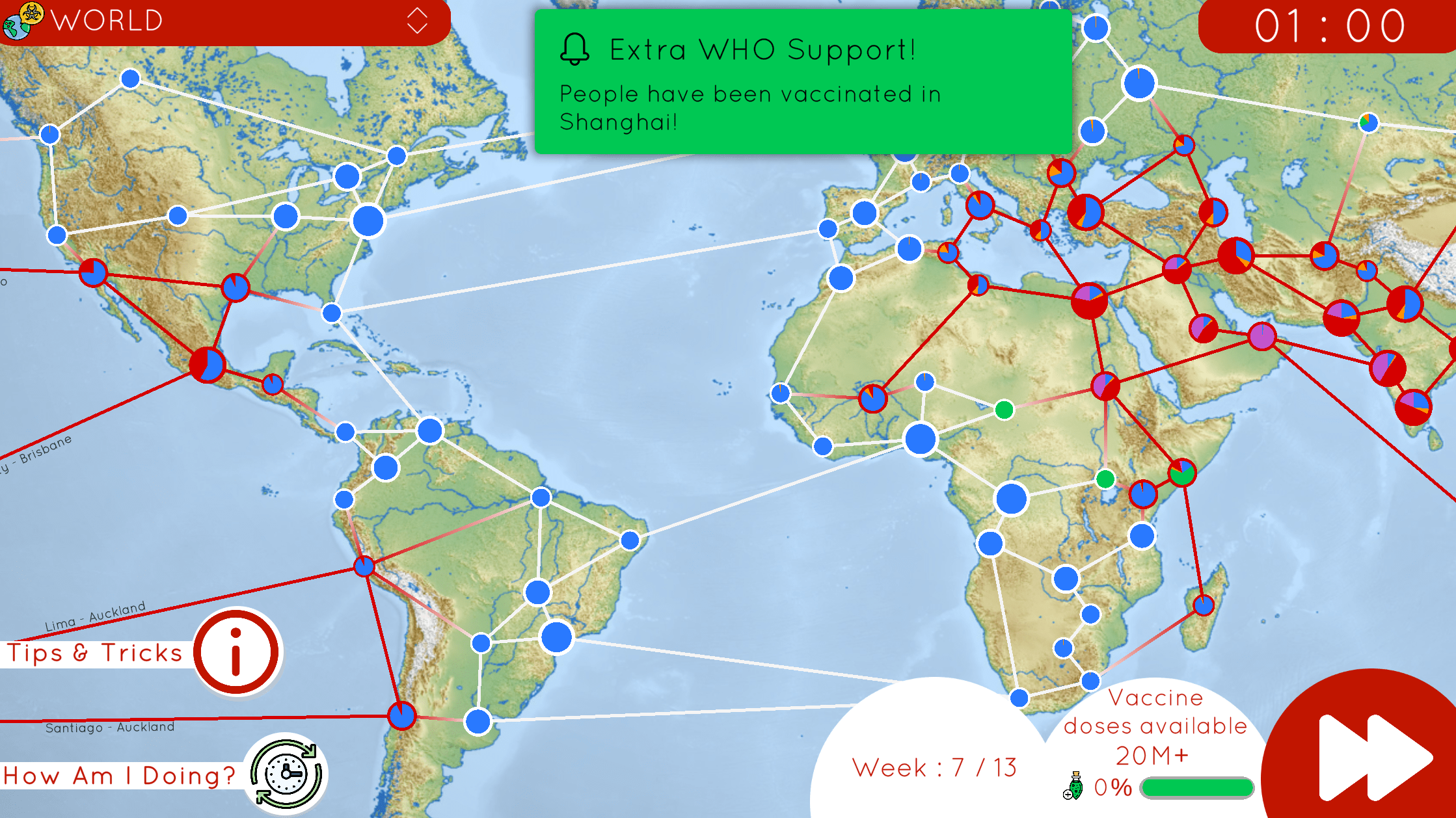MSc
Computer Games Programming
Content navigation menu
Why study MSc Computer Games Programming at Goldsmiths
This MSc is tailored for people who want to work in the game industry. You will learn multi-platform game development and gain a solid foundation in programming to help you develop your skills. The MSc has a strong focus on business and entrepreneurship, including the possibility to work with industry partners as part of your internship.
- As a fast-growing 150-billion-dollar business, the game industry offers countless professional opportunities. The MSc Computer Games Programming is right for you if you want to make game development a sustainable career and to work in this creative and rewarding industry.
- This is also one of the only programmes taught by actual game developers, designers, and artists with years of experience in the game industry.
- Learn how to design and develop games, using state-of-the-art tools and game engines from actual game developer and industry veterans.
- Focus on which skills you want to learn through a selection of optional modules.
- Collaborate with colleagues from other courses, including the and the .
- Build your portfolio through practical coursework.
- Access state-of-the-art game labs and facilities.
- Get your first internship in the game industry (or work on a research project instead).
- Take part in annual events and game jams organised by the department, and be part of the creative and diverse environment that surrounds Goldsmiths.
- Access a strong UK community of publishers and creators with innovative voices creating ground-breaking titles.
Contact the department
If you have specific questions about the degree, contact Alan Zucconi.
Length
1 year full-time or 2 years part-time
Entry requirements
You should have (or expect to be awarded) an undergraduate degree of at least second-class standard in a relevant/related subject, such as Game Design/Programming or Computer Science. You might also be considered if you can show that you have the ability to work at postgraduate level.
Fees
Home - full-time: £12520
Home - part-time: £6260
International - full-time: £18560
Department
Who should apply
The MSc Computer Games Programming is the perfect fit for:
- People who want to find a job in the game and entertainment industries.
- Programmers who want to learn how to create games.
- Game developers who want to improve their programming skills.
- Technical artists who want to use code to create interactive and procedural artworks.
- Game designers who want to learn coding to bring their ideas to life.
- Creatives who want to use interactive technologies for their projects.
There are no technical prerequisites for the MSc, as the course will cover the basics of programming and mathematics in the first week. However, a computer science background is strongly recommended, and any experience with programming languages or game engines is very welcome.
Choosing your pathway
There are two pathways available to all students in the MSc Computer Games Programming - Internship and Research.
Students on the Internship pathway are required to take part in an industry placement during the Summer Term. This is the perfect option if you want to use this opportunity to kickstart your career in the game industry.
Students on the Research pathway will work on a final project. This is recommended if you want to pursue an academic career, or if you want to deepen your knowledge in a specific area.
The pathway must be chosen at the moment of your enrolment, but might be changed on a case-by-case basis.
MA Computer Games: Art & Design
If you are interested in the design process, 3D modelling and animation, you may want to find out about the MA Computer Games: Art & Design.
Students on the MSc Computer Games Programming work alongside students on this MA programme, and if you are unsure which programme is for you, you might be able to switch between them in the first two weeks.
What you'll study
You will study four compulsory modules that will deepen your skills in game design and programming, in addition to teaching you the fundamentals of mathematics and entrepreneurship.
| Module title | Credits |
|---|---|
| Games Programming 1 | 15 credits |
| Mathematics for Games and V&AR | 15 credits |
| Programming for Game Engines | 15 credits |
| Game Design and Analytics | 15 credits |
Internship and Research pathways
Students on the Internship pathway are required to take part in an industry placement during the Summer Term.
Students on the Research pathway will work on a final project instead.
Note about optional modules (if available): The above is indicative of the typical modules offered, but is not intended to be construed or relied on as a definitive list of what might be available in any given year. The module content and availability is subject to change.
Assessment
Every module is assessed via coursework only – there are no exams on this programme. This will also give you the unique chance to work on your portfolio.
Entry requirements
You should have (or expect to be awarded) an undergraduate degree of at least second class standard in a relevant/related subject, such as Game Design/Programming or Computer Science.
You might also be considered for some programmes if you aren’t a graduate or your degree is in an unrelated field, but have relevant experience and can show that you have the ability to work at postgraduate level.
In some instances, we may ask to see more of your work or to conduct a short interview.
International qualifications
We accept a wide range of international qualifications. Find out more about the qualifications we accept from around the world.
If English isn’t your first language, you will need an IELTS score (or equivalent English language qualification) of 6.5 overall and no element lower than 6.0 to study this programme. If you need assistance with your English language, we offer a range of courses that can help prepare you for postgraduate-level study.
How to apply
Apply directly to Goldsmiths using our online application system
Before submitting your application you’ll need to have:
- Details of your academic qualifications
- The email address of your referee who we can request a reference from, or alternatively a copy of your academic reference
- Copies of your educational transcripts or certificates
- A personal statement – this can either be uploaded as a Word Document or PDF, or completed online. Please see our guidance on writing a postgraduate statement
You'll be able to save your progress at any point and return to your application by logging in using your username/email and password.
Submitting your portfolio
A portfolio of relevant work (such as digital games, programming samples, art-based/sketchbook, games assets, design documents) is required for your application. This could take whichever form works best to showcase your work, although a PDF or a video are strongly encouraged.
If you have worked on a game, the best way to showcase it is to include a link to a gameplay video. Please be advised that due to safety reasons, we cannot play executable or install files sent by applicants; so a video and a WebGL build would be ideal to showcase your games.
If you have worked on other, non-games related creative projects, you are welcome to show that in your portfolio, as everything that can demonstrate your creativity and commitment is welcome. Please note that our system has a maximum file size of 20mb so you may need to host your work elsewhere and upload a link.
Proficiency at programming
You may be required to demonstrate sufficient proficiency at programming in a major language, such as C, C#, C++ or Java, before being accepted on the programme. This may take the form of test or – during an interview – a practical challenge to programme a well-known method or algorithm.
When to apply
We accept applications from October for students wanting to start the following September.
We encourage you to complete your application as early as possible, even if you haven't finished your current programme of study. It's very common to be offered a place conditional on you achieving a particular qualification.
If you're applying for external funding from one of the Research Councils, make sure you submit your application by the deadline they've specified.
Late applications will only be considered if there are spaces available.
Find out more about applying.
Fees and funding
Annual tuition fees
These are the PG fees for students starting their programme in the 2024/2025 academic year.
- Home - full-time: £12520
- Home - part-time: £6260
- International - full-time: £18560
If your fees are not listed here, please check our postgraduate fees guidance or contact the Fees Office, who can also advise you about how to pay your fees.
It’s not currently possible for international students to study part-time under a student visa. If you think you might be eligible to study part-time while being on another visa type, please contact our Admissions Team for more information.
If you are looking to pay your fees please see our guide to making a payment.
Funding opportunities
BAFTA scholarship
UK students offered a place on this MSc are eligible to apply for the BAFTA Scholarship Programme.
Explore the Goldsmiths scholarships finder to find out what other funding you may be eligible for.
Paying your fees
Find out about paying your tuition fees.
If you are a UK student you may be eligible for a postgraduate loan.
Meanwhile our Careers Service can also offer advice on finding work during your studies.
Additional costs
In addition to your tuition fees, you'll be responsible for any additional costs associated with your course, such as buying stationery and paying for photocopying. You can find out more about what you need to budget for on our study costs page.
There may also be specific additional costs associated with your programme. This can include things like paying for field trips or specialist materials for your assignments. Please check the programme specification for more information.
Talks, events and conferences
We encourage all MSc Computer Games Programme students to work closely with their fellow MA Computer Games: Art and Design colleagues. We strive to provide an ideal environment for teamwork on games development projects and assignments, better preparing students to face a job in the game industry.
Students also have access to the Computing Department VR Studio containing HTC Vives, Oculus VR headsets, and a multi-camera motion capture studio for development work.
On top of that, each year we bring guest speakers to Goldsmiths from the game industry. This is one of the ways we create more links with the industry and can offer our students help in getting internships in various games studios during the summer term.
Seminar Series: Games & Entertainment Industries
A series of talks organised by Prof William Latham and Richard Leinfellner, bringing key figures from the creative industries all around the world. The list of previous speakers includes:
- Steve Goss, Creative Director, Supermassive Games
- Richard Wilson, Head of TIGA
- David Bishop, Head of Game Design, MindCandy
- John Ribbins, Creative Director, Roll7
- Jeff Wagner, Senior Technology and Production Consultant, SideFx
- Russell Clarke, Director of Product Development, Ideaworks Game Studio
- Sam Martin, Head of Technology, Geomerics
- Jonathan Taylor, MediaTonic
- Lee Singleton, Square Enix
- David Amor, MAG Interactive
- Greg Furber, Rewind
- Adam Whittaker, Natural Motion/Zegami
- Andrew Oliver and Phillip Oliver, Rebellion
- Tom Hegarty, Roll7
- Sam Hayhurst, 22 Cans
- Matt Carrol, Sports Interactive
- Martin Rigby, Investor
- Gaetano Dimita, IP Games Expert, Queen Mary Legal Faculty
Games Library Night
A biannual event taking place during Reading Week and organised by course leaders Alan Zucconi and Federico Fasce, which celebrates the more independent side of the game industry. We use these opportunities to showcase students' games to the public and give space to underrepresented voices in the industry. The list of previous speakers have included:
- Chris Priestman, Writer, designer, & editor
- Leon Killin, Founder, Balance Patch
- Marina Díez, 3 of Cups Games
- Jupiter Hadley, Founder, IndieGamesPlus
- Allan Cudicio, Twin Drums
- Anisa Sanusi, Founder, Limit Break Mentorship
Global Game Jam
The Global Game Jam is a yearly event in which people from all over the world work on making a small game over the course of a weekend. For three years in a row, Goldsmiths has been proudly hosting the largest GGJ site in London. Thanks to the support of the Hacksmiths, we offered space, food and even beds to all students and developers who took part in the jam.
We also run a series of workshops and talks, which have included:
- Rex Crowle ("Knights And Bikes", "Tearaway", "LittleBigPlanet")
- Marijam Didžgalvytė, Left Left Up
- Amy Dickens, Developer Advocate
- Claire Blackshaw, Media Molecule
- Sergio Ronchetti, Fallen Flag Studio
Other events
Here at Goldsmiths we also organise other inter-departmental events. This includes several "Tea & Testing" sessions during the year, which give students a safe space to playtest their games. We also run occasional career fairs opened to all postgraduate students at Goldsmiths.
Industry placements and career paths
Placements
As part of the MSc, students may choose to do an internship with a games-related company. Over the years we worked closely with industry leaders and game studios to offer industry placements.
Many internships result in permanent positions, and almost 100% of our graduates find work four to five months after finishing the programme. Some have gone on to work in major studios like EA, Ubisoft, Sony, Creative Assembly, Microsoft, Cinesite, Framestore, Splash Damage, Rebellion Studios, Mediatonic, Frontier, Supermassive and Roll7, as well as getting funded for start-ups such as Terrardhard.
The MSc Computer Games is the perfect fit for anyone who is – or wants to be – in one of the following positions:
-
People who want to find a job in the game and entertainment industries
-
Programmers who want to learn how to create games
-
Game Developers who want to improve their programming skills
-
Technical Artists who want to use code to create interactive and procedural artworks
-
Game Designers who want to learn coding to bring their ideas to life
-
Creatives who want to use interactive technologies for their projects
Career support
As a fast-growing 150-billion-dollar business, the game industry offers countless professional opportunities. The MSc Computer Games Programming is right for you if you want to make game development a sustainable career and to work in this creative and rewarding industry.
This is also one of the only programmes taught by actual game developers, designers, and artists with years of experience in the game industry.
Students are supported from the start to the finish of this programme in order to understand the different potential career journeys they can follow and to build a portfolio of work to demonstrate their capability to gain employment or freelance work in that area. Assessment has been designed to facilitate this process through the development of transferable or soft skills listed in the section above. Regular guest lectures from industry support the development of sector knowledge and awareness of different career paths.
Find out more about employability at Goldsmiths.
Student work
The Vaccination Game
The Vaccination Game is the result of a seven-month work placement with the University of Oxford. The project is not supposed to be used as a tool to predict epidemics, instead, it should be used to understand the importance of vaccination and how it can prevent epidemics.
You can play The Vaccination Game here.
Find out more about Giacomo's project in this interview with Goldsmiths and this interview with Oxford University.
BioBlox 2D, 3D and VR
These games were developed by some of our past MSc games programming students.
BioBlox2D is a spin-off from BioBlox and is a smartphone/tablet game based on docking molecular fragments into a receptor. It is available from the Apple app store and Google Play.
BioBlox3D is a free online serious game about proteins docking. This problem is key to the understanding of all cellular processes and in particular to the practical application of drug design.
BioBlox 2D
BioBlox 3D
BioBlox VR
Staff
Staff teaching on this programme include:




